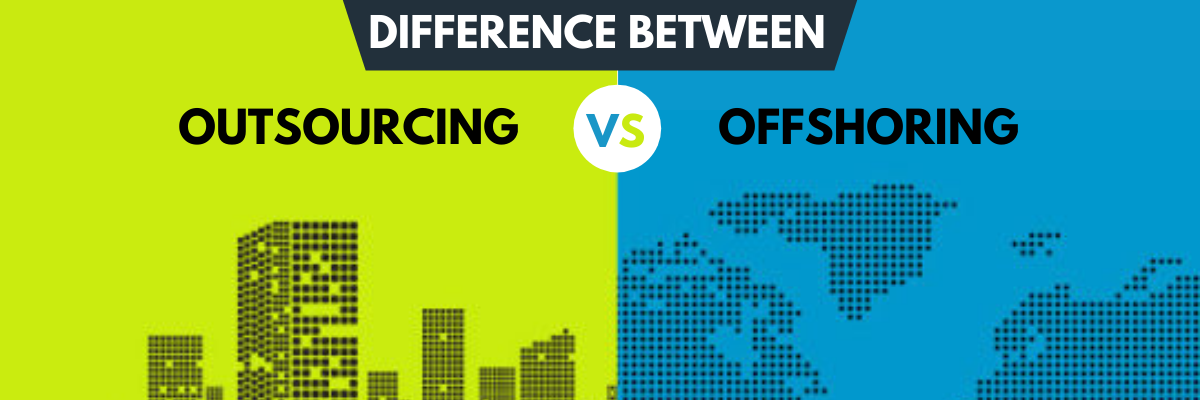As the demand for offshore software development grows, so does the necessity for an offshore development center (ODC). Organizations are slowly getting acquainted with ODC due to its cost-effectiveness and excellent access to a large pool of tech specialists. In fact, it is steadily becoming a popular choice for reliable and trustworthy software development solutions.
According to Statista, 64 percent of software application development was outsourced in 2017.
So let’s say you want to use an ODC to minimize software development expenses and increase software quality, but you're not sure where to begin. If that's the case, this article is for you.
What Is the Offshore Development Center in Software Development?
An offshore development center is a group of integrated talents based in a foreign country that provides offshore software development services to an organization. Simply explained, it's a subsidiary of a corporation based in a different country. The cost of living in the ODC's location is usually lesser than the mother company's location. And, that’s one of the prominent reasons why companies are shifting their focus to ODCs.
Setting up an ODC, on the other hand, necessitates the availability of resources for the company's integration. Apart from programmers and testers, offshore development businesses typically have professionals in all management and technical elements to lessen the primary office workload.
What are the Benefits of Having an Offshore Development Center?

Why are huge firms increasingly flocking to offshore development centers? What are the benefits to your firm of establishing one? This section discusses the several advantages of establishing an offshore software development center for your company.
- What is an offshore development center, if not a model, that allows you to concentrate on your core business while outsourcing software development? The team is solely focused on that project, ensuring stability throughout the project lifespan and scalability as the client's demands change.
- ODC speeds up development for large projects, particularly when more than 30 people are engaged. When an ODS is a viable working model, this is the case. Otherwise, you should adopt the outstaffing strategy, which employs high-level specialists.
Is There a Difference Between Offshoring and Outsourcing?

Many people confuse "outsourcing" and "offshoring," although they are two separate concepts. So, what are the distinctions?
Outsourcing is defined as "getting specific services or products from a third-party organization." Outsourcing can be done to a corporation located anywhere in the world. Offshore, nearshore and onshore are the three types of locations.”
On the other hand, offshoring is defined as "obtaining services or products from another country." Offshoring occurs when, for example, a vehicle manufacturer in the United States establishes a facility in Thailand to manufacture specific parts.”
- Location of Work
Offshoring appears to be limited to international offshoring based on these definitions. Outsourcing can be done both locally and worldwide at the same time. Most of the time, offshore entails overseas outsourcing, although there are instances where a corporation offshoring without outsourcing.
IBM, for instance, can outsource work to its Indian offices. Even yet, they're offshore rather than outsourcing because both the individuals delivering the work and the people executing the job are from the same firm.
- The Purpose of Every Activity
Outsourcing is all about specialization: a firm contracts certain business functions to a specialized, external party to concentrate on its core competencies and activities.
On the other hand, Offshoring strives to reduce costs by taking advantage of the cost differential between the two countries.
- Control Levels
It has more control when a corporation hires an offshore staff rather than outsourcing to a third party. Although they are separate legal organizations, ODCs follow the company's instructions.
Meanwhile, an outsourcing provider works autonomously to fulfill critical duties, potentially putting the company's control at risk.
Offshore Software Development Center's Key Members
If you want to start an offshore software development center, you must first figure out the critical players. The following are essential roles for any new business:
- Test Engineers - Their job will be to inspect the final product for quality and integrity.
- Account Manager - They will manage the client relationship and guarantee that their needs are met.
- Designers and developers - They will create, install, test, and maintain the software.
- Project Manager - They will be in charge of the entire project, from planning to implementation. Most essential, they will make sure that all resources are adequately utilized.
- Usability Engineers - Conduct tests to assess your product's usability or user-friendliness.
- Graphic Designers - Visual and graphical concepts or language are created by graphic designers to promote a product's unique persona or brand.
- Technical and Content Writers - Create instructions and content for software or websites.
What is the Offshore Development Center Model, and How Does It Work?

Learn more about the most popular ODC models and how they work below:
ODC Contractor Model
The central office makes specific requests to the contractor or offshore development center in this strategy. Then, depending on those needs, a team is formed.
This group will subsequently be in charge of various management and technical activities, such as analytic and system design, software updates, new code development, etc.
This concept is appropriate for small businesses.
ODC Customer Model
A custom team is chosen in this strategy depending on the customer's needs or the main office. Nonetheless, the main office will be responsible for far more activities than the Contractor ODC Model, including product research, analysis, and team management. On the other hand, the ODC team will mostly focus on coding.
This strategy is best suited to large organizations that can handle a huge number of jobs.
The Benefits of Using an Offshore Development Center
Offshoring allows businesses to become more competitive by saving money. Alternatively, they may decide to reinvest those savings into the business to expand and create additional local jobs, often in higher-skilled positions.
The following are the main benefits of establishing an offshore development center.
- Cost-cutting
The Offshore Development Center has its equipment, infrastructure, and a team of highly qualified experts. As a result, your business will not have to worry about the costs of putting in place the necessary infrastructure. The ODC project may get started considerably sooner and at a lower price than if you started from scratch.
- Having Access To A Large Pool Of IT Professionals:-
ODC gives you access to highly skilled IT teams with demonstrated IT expertise, abilities, and experience. In addition, leading ODCs place a strong emphasis on developing their staff’s capabilities so that they can provide the greatest solutions to your target clients.
- Great Operational Control
As previously stated, the ODC carefully follows instructions from the head office. You'll be able to assess and follow the present state of the project. You might wish to talk to the ODC company about contract conditions. If the outcomes do not meet your expectations, you have the option of requesting that the ODC rectify the project at an additional expense.
- Continual Technical Assistance
Throughout the project's life cycle, ODC provides ongoing technical support. Offshore enterprises employ their skills to fulfill duties during the project. For your highly technical projects, there would be no scarcity of the right talent when you have the support of your ODC team.
- On-time completion of projects
ODC teams can deliver on schedule because they work in ideal settings and adhere to the project timelines and guidelines established by the main office from start to finish.
Additionally, they effectively collaborate with the in-house team, allowing the project to be completed in less time overall.
- Efficient Resource Allocation
The number of resources required varies depending on the project. An offshore development center functions as an extended arm that can handle the activities of in-house staff, allowing you to scale your IT department more effectively. Allocating resources without an ODC would be challenging.
Are you looking for a reliable technology partner?
YTII has been exploiting digital technology in several industries to benefit businesses, mid and large enterprises, and startups. We can assist you in developing high-quality software solutions and products and provide various connected professional services.
Your Team in India has worked on many high-profile projects, forming specialized teams and providing the necessary infrastructure to support mission-critical software development. We stand out as an example of how a dedicated offshore development center, a dedicated team, and infrastructure can help companies power their teams. If you already have a software product in mind, you can chat with us about your possibilities and receive a cost-effective package that meets your requirements. Contact us to know more about our services or to get a free consultation.






